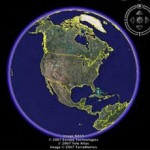
Mountain View, California — In an attempt to more effectively address government-imposed censorship to specific areas, much like Twitter’s recent announcement regarding country-specific censorship, now the search engine titan Google is following the trend by redirecting Blogger blogs to country-specific domains.
Google has quietly announced changes to its free-blogging site, which now makes content on its Blogger platform selectively available to users based on local laws, but the move did not attracted widespread awareness until it was noticed by technology blog TechDows this week.
In the next few weeks, under the changes, the URLs for its Blogger blogs will be redirected to country-code top level domains (ccTLD), Google said in a note on its support forums.
For instance, if a copyright holder or any government official Australia, issues a content pull-down notice and Google decides that the data is in violation of Australian law, which allow specific content to be blocked in Australia where censorship is required, but keep it live elsewhere, if legal.
This change to Blogger essentially empowers Google to do the same with its blogging platform what Twitter’s highly-controversial announcement last week did–that it will selectively deliver content to users based on geography in order to appease countries with “different ideas about the contours of freedom of expression.” In a blog post announcing the changes, Twitter said it would notify users if it withheld posts.
This drastic change enable Google to censor specific blogs in a single country, rather than worldwide, where rules surrounding pornographic, religious, or political content differ from other parts of the world.
But why make the change? “Migrating to localized domains will enable us to continue promoting free expression and responsible publishing while providing greater flexibility in accommodating with valid removal requests pursuant to local law,” writes Google on the Blogger support page. “By embracing ccTLDs, content removals can be accomplished on a per country basis, which will limit their impact to the smallest number of readers. Content removed due to a specific country’s law will only be removed from the relevant ccTLD.”
Moreover, these severe change to Blogger comes amid recently erupted legal trouble for Google in India, where it, along with Facebook, Microsoft, Yahoo! and 17 other Internet companies, are being prosecuted by the Indian government for allowing the publication of offensive material. The prosecution follows a lawsuit filed by Vinay Rai, a Dehli-based journalist, who charged that these companies allowed “objectionable content” into India’s digital space. Google has not publicly stated that the changes to Blogger and the legal action in India are connected.
Another attribute that appears to be of dodging the country code top-level domains, at least in relation to accessing the content:
Blog readers may request a specific country version of the blogspot content by entering a specially formatted “NCR” URL.
NCR stands for “No Country Redirect” and will always display buzz.blogger.com in English, whether you’re in India, Brazil, Honduras, Germany, or anywhere.
Not so surprisingly, Google does censor content on some of its properties in other ways. On YouTube, for instance, some content is blocked in certain countries based on users’ IP addresses.
“On occasion, YouTube blocks specific content in order to comply with local laws in countries where YouTube has launched,” reads the YouTube policy page. “For instance, certain Nazi imagery is unlawful in parts of Europe.”


